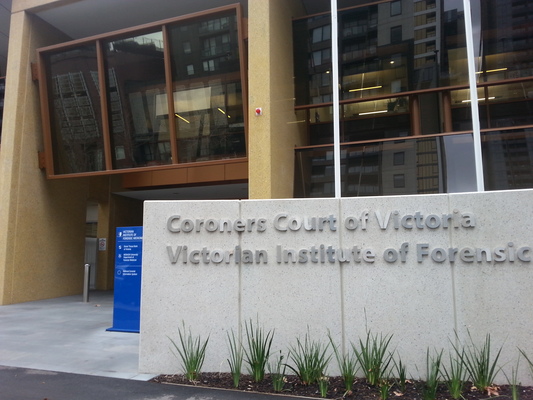
By CAM LUCADOU-WELLS
A BEREAVED Narre Warren family has blamed a “broken” mental health system for the death of a father of two who was killed by a freshly-released acute-care patient.
On Monday, the 52-year-old victim was found by State Coroner John Olle to have died from multiple injuries and immersion in a home swimming pool in Narre Warren on 25 January 2009.
He was described by Mr Olle as a “bloke’s bloke” and a “hands-on father” who enjoyed a drink and loved to fish and cook.
The perpetrator – whose name was omitted in Mr Olle’s report – was a work colleague who killed the victim during a weekend drinking session.
He had been released as an involuntary patient from Casey Hospital on 16 January after taking his parents hostage in a seven-hour siege two weeks earlier.
After the finding, the victim’s widow said she had pushed for the inquest because she didn’t want another family to go through the same torment.
“My husband was in the wrong place at the wrong time with the wrong person,” she said.
“It could happen to anyone unless we see change.
“Our system is broken and it needs to be fixed.”
Mr Olle’s inquest focused on the killer’s medical management but he emphasised his role was not to lay blame.
In his report, Mr Olle referred to the man making threats to kill beforehand, his frightened parents intending to take out intervention orders, and his instability and intimidation in the ward.
Two days before the fatal assault, a case manager interviewed the man and judged him to be threatening in manner but not a risk of harm to others, Mr Olle said.
“(His) hallucinations and delusions were still present and real to him.”
Mr Olle said the care by Monash Health staff was “not unreasonable or inappropriate” in the circumstances but “hindsight has revealed poor clinical decisions were made”.
He recommended establishing therapeutic recovery or step-down units for acute-care patients before releasing them into the community.
“In general medicine, it would be unacceptable if a patient was discharged into the community from an intensive care unit.
“Why is it not equally unpalatable in a mental health setting?”
Mr Olle also recommended access to specialist forensic psychiatrists – the absence of which made clinical decision making “extremely difficult” in this case.
“Sadly, there is a marked over-representation of persons who suffer serious mental health illness in the commission of serious crime, including homicide, in Victoria.”
The victim’s wife said she backed the recommendations, though adding that a “severe shortage” of psychiatric beds needed to be solved.
“Budgetary constraints should not stop these (recommendations) from occurring.
“You can’t put a price on a life.
“If this had have been in place my husband would still be alive today and we would still be a happy family unit.”
The perpetrator is serving eight years’ jail for the victim’s manslaughter – although he is eligible for parole this year.
Meanwhile, the victim’s wife is now a single parent bringing up two daughters.
“Not a day goes by that we don’t think of him and miss him.
“We’ve had lots of support from family and friends but we lost someone we loved and who loved us – through a faulty system.
“The system let us down.”






